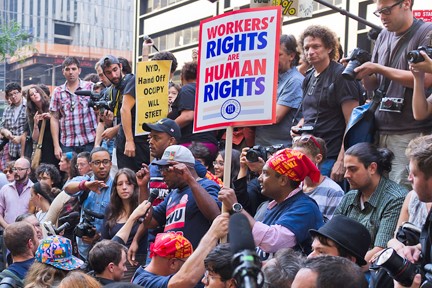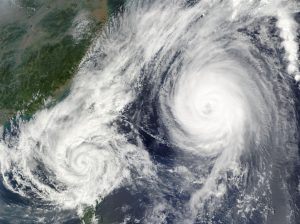Amazon Workers Work to Form a Union against their Former Employer

Workers strikes and unions have been happening forever, but a successful one against Amazon is one that most people couldn’t even imagine until it happened.
April 8, 2022
Amazon, one of the biggest companies in the world, and notorious for poor working conditions, has recently had its employees participate in a strike against the company. As the second-largest private employer in the world, the company became even more dominant, hiring hundreds of thousands of employees to keep up with the significant increase in online orders.
Two years ago, Christian Smalls, an employee from an Amazon warehouse in New York City, following his participation in a walkout over Amazon’s pandemic response was fired for his action, being painted as not smart or articulate by the company.
Zapolsky, the Amazon executive who described Smalls as “not smart or articulate” later released a statement saying: “My comments were personal and emotional. I was frustrated and upset that an Amazon employee would endanger the health and safety of other Amazonians by repeatedly returning to the premises after having been warned to quarantine himself after exposure to virus Covid-19. I let my emotions draft my words and get the better of me.” But the damage had already been done.
When Covid had first begun, Smalls had helped organize a work strike at a company warehouse on Staten Island, New York in protest over a lack of protective gear and hazard pay for employees. Smalls was fired by Amazon for “violating social distancing guidelines and putting the safety of others at risk.”
Smalls’ removal from work was called disgraceful by many labor supporters and politicians even including Bernie Sanders.
It’s disgraceful that Amazon, which is owned by the richest man in the world, is not only failing to protect its workers but has now fired a worker for protesting dangerous conditions. I stand with Chris and all Amazon workers fighting for their safety. https://t.co/CRm750EvK3
— Bernie Sanders (@BernieSanders) March 31, 2020
Though many went back and forth in their opinions surrounding the action. Some people stood with the company and pushed the narrative that Smalls was only putting others in danger by being so close to others, and Smalls felt that he was right in organizing the protest. Jay Carney, a former press secretary for Barack Obama, who joined Amazon in 2015, for example, argued the company’s side.
. @SenSanders, I’m confused. Thought you wanted us to protect our workers? Mr. Smalls purposely violated social distancing rules, repeatedly, & was put on Paid 14-day quarantine for COVID exposure. 3/30 he returned to the site. Knowingly putting our team at risk is unacceptable. https://t.co/WR49t6Qkij
— Jay Carney (@JayCarney) April 1, 2020
Through The Guardian, Chris Smalls published his response in the form of a letter to Jeff Bezos. He wrote “Another demand of ours was that people who can’t go to work because of underlying health conditions be paid. Why do they have to risk catching the virus to put food on the table? This company makes trillions of dollars. Still, our demands and concerns are falling on deaf ears. They don’t care if we fall sick. Amazon thinks we are expendable.”
Dania Rajendra, the director of Athena, a coalition of labor and community groups campaigning against Amazon agreed with Smalls’ stands, saying in a statement that “Hundreds of Amazon workers are telling the public about the risk Amazon poses to their health, their families and the communities they live in – and we’ve got Amazon execs, working from home, trying to fix the PR problem instead of the public health problem.”
Because Amazon was so unresponsive to the concerns of Smalls and other amazon employees taking his side, many employees decided to stage a walkout to alert the media about the situation. This protest later evolved into the Amazon Labor Union.
The group and the movement have made history, marking the first time a group of US workers has been able to successfully vote to form a union in the 27 years of Amazon. Even with Amazon’s efforts to prevent the movements, the actions taken so far have already motivated workers to unionize and ‘stand up for themselves as well.
Through the Twitter account known as @Shut_downAmazon, Christian Smalls tweeted on April 1st, saying he hoped that Amazon got what it wanted.
@amazon wanted to make me the face of the whole unionizing efforts against them…. welp there you go! @JeffBezos @DavidZapolsky CONGRATULATIONS 🎉 @amazonlabor We worked had fun and made History ‼️✊🏾 #ALU # ALUfortheWin welcome the 1st union in America for Amazon 🔥🔥🔥🔥
— Christian Smalls (@Shut_downAmazon) April 1, 2022
In an interview with CNN Business, Smalls said that the ALU wished to improve working conditions for Amazon workers including higher wages, job security, better working conditions, longer breaks, making warehouse workers shareholders again, and securing funds to cover the cost of transportation to and from the facility.
Other worker groups such as Amazonians United and a group at Seattle Amazon Fresh have made similar demands.
“I would never agree to anything that doesn’t benefit us, and I’m talking about us at the bottom, the entry-level workers,” said Smalls. “We’re at least a year or more away from even thinking about dues. We have to fight for a contract first.”
The Amazon Labor Union says that they have no plans to turn over its operations to an established union but does plan to launch nationwide organizing and training soon.
After proving successful with their efforts, many groups have reached out to ALU hoping to help fight, and even those who voted against them say they hope they can achieve their goal.
“Amazon workers around the country will now have a belief that it’s possible to organize and win an election — but it will still be difficult,” said labor law professor, Rebecca Givan. “The odds are always, always stacked against workers organizing in a situation like this, but this is proof that it can be done and it will likely inspire workers elsewhere.”





